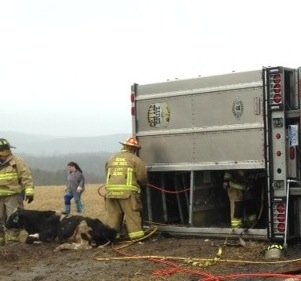Memorial proposed for cattle killed on Rock Road
— Photo from Charles Tommell Jr.
Young cattle are released from a long double-deck trailer that turned on its side as its driver tried to negotiate Rock Road in Berne on April 15 before noon. A total of 11 animals were reported dead as a result of the accident, and three more had to be euthanized after, their owner, Charles Tommell Jr. said.
BERNE — An animal-rights organization is hoping the first tombstone memorializing animals killed in a road accident will be placed in Berne, where several cattle were killed on April 15 when a trailer carrying them to a feedlot tipped over.
People for the Ethical Treatment of Animals member Amrit Michelle Singh, of Colonie, e-mailed Albany County Department of Public Works Commissioner Darrell Duncan on April 23 requesting permission to install a 10-foot memorial tombstone near the site of the accident, at Rock Road and Switzkill Road, for one month. It would honor the cattle, caution drivers, and promote vegan eating, she wrote.
“Anytime there’s something in a county right-of-way, we would be liable, and so we do not allow anything to go up on a county right-of-way,” said Mary Rozak, spokeswoman for the Albany County executive's office.
Laura Cascada, PETA’s senior campaign coordinator, said the permission of adjacent property owners could be sought in Berne. Half a dozen such memorial proposals throughout the country have been supported by PETA, she said, but none have been erected so far.
“It’s almost like an advertisement for their cause, which is fine, but I don’t think it’s appropriate alongside the road of an accident scene,” said Charles Tommell Jr.
"Tell them, 'Good luck.'" Michael Volmering, the truck's driver, said on Friday — his total comment before hanging up the phone.
One-hundred-and-four of Tommell’s feeder cattle were being hauled to a Kansas feedlot on April 15 when Volmering turned a curve, tipping the vehicle onto its side — his only accident in 20 years of driving, he said.
“This tribute will let commuters know that the best way to prevent tragedies such as this one is to go vegan, because cows shouldn't have to make terrifying trips to feedlots and slaughterhouses at all,” Singh wrote in her letter. “These intelligent animals are crammed into trucks and hauled in all weather extremes without food, water, or veterinary care, just so that they can be eaten.”
A board member for Albany Vegan Network, Singh wrote that PETA has nearly 10,000 members and supporters in Albany. She told The Enterprise she grew up in rural Canton, in St. Lawrence County, where her family got milk from a local farm. She said she eats a vegan diet, which omits animal products, for her health, and because of the treatment of animals killed for food and the impact of meat production on the environment.
“I think I could never go back. I think it’s such a strong belief inside of me,” Singh said of her ethical consideration for animals killed for meat. She said she did not contact Tommell and spoke generally about the lack of veterinary care in such transportation accidents, and animals' fear and anxiety during slaughter.
Tommell stressed that he cares for his animals and didn’t load them in excessive numbers two weeks ago. He said his experience and United States Department of Agriculture guidelines limit the numbers he loads. Eleven cattle died at the time of the accident, and three more died afterward, Tommell said.
“I spent a lot of time with them, medicating them, keeping them comfortable, letting them rest and get better,” Tommell said of his cattle after the accident.
Tommell said his cattle ride for eight to 10 hours in the trailer to Kansas before they are unloaded to drink, eat, and rest for the same period before going on the road again. He said his Roman Catholic beliefs inform his farming, which he has done his whole life.
“Personally, I believe that livestock have a purpose on this Earth, my personal opinion,” said Tommell. “That being said, I believe we are supposed to take very good care of the animals while they’re in our custody.”



